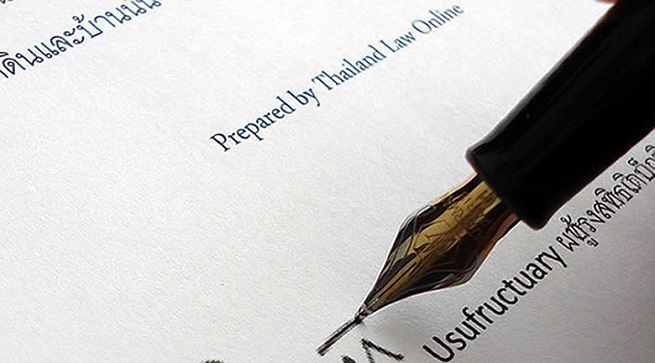Usufructs in Thailand. In Thailand, a usufruct is a legal right that allows a person (the usufructuary) to use and benefit from another person’s property for a set period, typically up to 30 years or for the usufructuary’s lifetime. Usufructs provide foreigners with a secure way to use land without ownership, often for agricultural, residential, or business purposes, making it a popular arrangement in Thailand.
1. Understanding Usufruct Rights
A usufruct grants the usufructuary broad rights to use and manage the property, including the right to lease it to others and derive income from it, though the usufructuary cannot sell or mortgage the property itself. The property owner retains full ownership but relinquishes control and use rights to the usufructuary during the usufruct term.
Key features include:
- Exclusive Use and Enjoyment: The usufructuary has exclusive rights to enjoy the benefits of the property.
- Revenue Generation: The usufructuary can rent or lease the property to generate income.
- Maintenance Obligations: The usufructuary is responsible for the property’s upkeep but may not make permanent alterations without the owner’s consent.
2. Establishing a Usufruct in Thailand
a) Drafting the Agreement
The usufruct agreement should clearly outline the rights, term, and obligations of both parties. Important components include:
- Term of Usufruct: The duration, which may be a maximum of 30 years, the usufructuary’s lifetime, or a shorter period as specified in the agreement.
- Rights and Restrictions: Detailed clauses outlining the extent of use, leasing rights, and any limitations on alterations.
- Maintenance Responsibilities: Obligations for maintenance, repairs, and any costs associated with the upkeep of the property.
b) Registration with the Land Department
Usufructs must be registered with the Land Department to be enforceable and legally binding. This involves submitting the usufruct agreement, property title deed, and identification documents of both parties. The Land Department charges a small registration fee for this process, and the usufruct is documented on the title deed, establishing its legal validity.
3. Common Uses of Usufructs in Thailand
a) Agricultural and Residential Purposes
Usufructs are commonly used for agricultural land, allowing farmers to cultivate land and earn revenue without owning it. Additionally, foreigners who cannot own land outright often use usufructs for residential purposes, securing lifetime use of land on which they build homes or operate small businesses.
b) Business Ventures
While not as common as for agricultural or residential purposes, usufructs can be useful in certain business arrangements. For example, a business can lease or operate on land under usufruct, offering flexibility in business location without requiring direct ownership.
4. Advantages and Disadvantages of Usufructs
Advantages
- Security of Tenure: Usufructs offer foreigners a legally recognized way to use property without ownership, which is particularly valuable given Thailand’s restrictions on foreign land ownership.
- Income Generation: Usufructuaries can rent the property out and earn revenue, making it suitable for both residential and commercial uses.
- Long-Term Use: With terms up to 30 years or the lifetime of the usufructuary, usufructs provide long-term security and use rights.
Disadvantages
- No Ownership Rights: Usufructs do not confer ownership, so the usufructuary’s rights end when the usufruct term expires.
- Non-Transferable: The usufructuary cannot transfer the usufruct rights upon death; they are extinguished unless otherwise specified as renewable.
- Limited Changes Allowed: Usufructuaries cannot make significant alterations or improvements without owner consent, restricting the extent to which they can modify the property.
5. Termination of Usufructs
Usufructs terminate under specific conditions:
- Expiration of Term: The usufruct ends once the agreed term or the usufructuary’s lifetime expires.
- Mutual Agreement: Both parties may agree to terminate the usufruct earlier than its specified term.
- Property Destruction: If the property is destroyed (e.g., in a fire or natural disaster), the usufruct terminates, as there is no property left to use.
6. Legal Considerations for Foreigners
Usufructs are especially valuable for foreigners because they provide a legally secure way to use property despite restrictions on outright land ownership. Foreigners seeking a usufruct arrangement should work with a qualified Thai lawyer to ensure the agreement aligns with Thai law and provides full usufruct rights.
Conclusion
Usufructs in Thailand offer a valuable legal solution for foreigners and locals who want to benefit from property without ownership. With a well-drafted, registered usufruct agreement, users can enjoy exclusive land use rights and income potential while protecting the property owner’s interests. Understanding the rights, responsibilities, and limitations associated with usufructs is essential for those considering this arrangement in Thailand.

